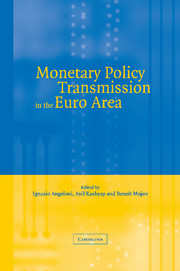 Monetary Policy Transmission in the Euro Area
Monetary Policy Transmission in the Euro Area Published online by Cambridge University Press: 22 September 2009
Introduction
This chapter investigates how monetary policy affects business real fixed investment in Belgium, through the interest rate channel and the broad credit channel. These channels are roughly associated with the effects that operate through the user cost of capital and the cash flow–capital ratio. An extensive version of this chapter can be found in Butzen, Fuss and Vermeulen (2001).
Our analysis relies on firm-level annual accounts data. To our knowledge, there is no firm-level evidence so far on the interest rate channel for Belgium. Only a few papers explicitly introduce the user cost of capital in their specification. One example is the cointegration analysis of Gérard and Verschueren (2000) on industry-level data that reveals differences in long-run elasticity of investment to the user cost across Belgian industries.
A couple of papers assess the relevance of financial constraints for particular groups of Belgian firms. The existence of these constraints is a necessary condition for the broad credit channel to be at work. Using an Euler equation framework Vermeulen (1998) finds that only firms that entirely depend on banks as providers of external funds are financially constrained. Deloof (1998) stresses the role of holding companies and corporate groups as providers of intra-group funds. Barran and Peeters (1998) show that firms affiliated to a coordination centre (a particular form of group membership, see section 2, p. 166) are less financially constrained than other firms. In contrast with this evidence, Bond et al. (1997) find no significant effect of financial variables in Belgium.
To save this book to your Kindle, first ensure [email protected] is added to your Approved Personal Document E-mail List under your Personal Document Settings on the Manage Your Content and Devices page of your Amazon account. Then enter the ‘name’ part of your Kindle email address below. Find out more about saving to your Kindle.
Note you can select to save to either the @free.kindle.com or @kindle.com variations. ‘@free.kindle.com’ emails are free but can only be saved to your device when it is connected to wi-fi. ‘@kindle.com’ emails can be delivered even when you are not connected to wi-fi, but note that service fees apply.
Find out more about the Kindle Personal Document Service.
To save content items to your account, please confirm that you agree to abide by our usage policies. If this is the first time you use this feature, you will be asked to authorise Cambridge Core to connect with your account. Find out more about saving content to Dropbox.
To save content items to your account, please confirm that you agree to abide by our usage policies. If this is the first time you use this feature, you will be asked to authorise Cambridge Core to connect with your account. Find out more about saving content to Google Drive.